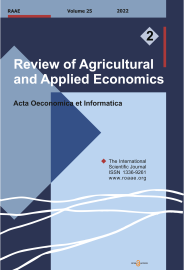KEYWORDS:
agriculture, technical efficiency, cotton, Togo
DOI NUMBER:
10.15414/raae.2019.22.02.88-95
ABSTRACT:
Cotton is a cash crop that occupies an important place in Togolese economy. However, a downward trend in productivity has been observed over the last twenty years, but the reasons are not well known. The purpose of this article is to determine the level of technical efficiency of cotton producers and analyse its determinants. The stochastic frontier analysis was adopted and data collected from 150 cotton producers in five regions in Togo was used. The results show that the average technical efficiency of cotton producers is 48.33%. It is therefore possible to increase the level of cotton production to 51.67% using the available resources. The factors that affect the technical inefficiency of farmers include the use of herbicides, the education level and the nature of the soil. In order to increase the productivity of cotton, policy should target on the capacity building of the producers by an effective support of the extension agents in order to ensure the follow-up of the technical itineraries.
Please Cite this Article as:
Essossinam ALI, Komi Tchotoubai KPAKPABIA (2019) Determinants Of Technical Efficiency Of Cotton Farmers In Togo. Review of Agricultural and Applied Economics. XXII (Number 2, 2019): 88-95. doi: 10.15414/raae.2019.22.02.88-95
URL for sharing:
https://roaae.org/1336-9261/doi/abs/10.15414/raae.2019.22.02.88-95
FULL TEXT PDF:
▼ direct download link| view online in fullscreen ▲
References:
▼ direct download link

